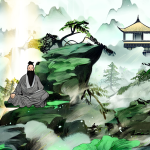《逍遥游》原文

北冥有鱼,其名为鲲。鲲之大,不知其几千里也;化而为鸟,其名为鹏。鹏之背,不知其几千里也;怒而飞,其翼若垂天之云。是鸟也,海运则将徙于南冥。南冥者,天池也。《齐谐》者,志怪者也。《谐》之言曰:“鹏之徙于南冥也,水击三千里,抟扶摇而上者九万里,去以六月息者也。”野马也,尘埃也,生物之以息相吹也。天之苍苍,其正色邪?其远而无所至极邪?其视下也,亦若是则已矣。
且夫水之积也不厚,则其负大舟也无力。覆杯水于坳堂之上,则芥为之舟;置杯焉则胶,水浅而舟大也。风之积也不厚,则其负大翼也无力。故九万里,则风斯在下矣,而后乃今培风;背负青天,而莫之夭阏者,而后乃今将图南。
蜩与学鸠笑之曰:“我决起而飞,抢榆枋而止,时则不至,而控于地而已矣,奚以之九万里而南为?”适莽苍者,三餐而反,腹犹果然;适百里者,宿舂粮;适千里者,三月聚粮。之二虫又何知!
小知不及大知,小年不及大年。奚以知其然也?朝菌不知晦朔,蟪蛄不知春秋,此小年也。楚之南有冥灵者,以五百岁为春,五百岁为秋;上古有大椿者,以八千岁为春,八千岁为秋。此大年也。而彭祖乃今以久特闻,众人匹之,不亦悲乎!
汤之问棘也是已。穷发之北,有冥海者,天池也。有鱼焉,其广数千里,未有知其修者,其名为鲲。有鸟焉,其名为鹏,背若泰山,翼若垂天之云,抟扶摇羊角而上者九万里,绝云气,负青天,然后图南,且适南冥也。斥鴳笑之曰:“彼且奚适也?我腾跃而上,不过数仞而下,翱翔蓬蒿之间,此亦飞之至也。而彼且奚适也?”此小大之辩也。
故夫知效一官、行比一乡、德合一君、而徵一国者,其自视也,亦若此矣。而宋荣子犹然笑之。且举世而誉之而不加劝,举世而非之而不加沮,定乎内外之分,辩乎荣辱之境,斯已矣。彼其于世,未数数然也。虽然,犹有未树也。
夫列子御风而行,泠然善也,旬有五日而后反。彼于致福者,未数数然也。此虽免乎行,犹有所待者也。
若夫乘天地之正,而御六气之辩,以游无穷者,彼且恶乎待哉?故曰:至人无己,神人无功,圣人无名。
中文翻译
北海有一条鱼,它的名字叫鲲。鲲的巨大,不知道有几千里;变化成为鸟,它的名字叫鹏。鹏的脊背,不知道有几千里;当它奋起而飞的时候,那展开的翅膀就好像悬挂在天空的云。这只鹏鸟啊,在海水运动的时候将要飞到南海去。南海是个天然形成的大水池。《齐谐》是一部专门记载怪异事情的书。《齐谐》上记载说:“鹏鸟飞往南海时,翅膀拍击水面激起三千里的波涛,乘着旋风盘旋飞至九万里的高空,它是凭借着六月的大风离开的。”山野中的雾气,空气中动荡的尘埃,都是生物用气息相互吹拂的结果。天色深蓝,这是它的真正颜色呢?还是因为天空高旷辽远而看不到尽头呢?鹏鸟在高空往下看,也不过是像人们在地面上看天一样罢了。
再说如果水的积蓄不深厚,那么它负载大船也就没有力量。倒一杯水在堂上低洼的地方,那么只能拿小草给它当作船;放上一只杯子就粘住不动了,是因为水太浅而船太大的缘故。风的聚积如果不雄厚,那么它承负巨大的翅膀就没有力量。所以鹏鸟飞到九万里的高空,风就在它的下面,然后才能凭借风力飞行;背负着青天,没有什么能阻碍它,然后才打算往南飞。
蝉和斑鸠讥笑鹏鸟说:“我一下子起飞,碰到榆树、檀树之类的树木就停下来,有时如果飞不上去,就掉在地上罢了。哪里用得着飞到九万里的高空再向南飞呢?”到郊外去旅行的人只要带三顿饭,吃完三顿饭就回家,肚子还是饱饱的;到百里外去旅行的人,头天晚上就要舂米做好干粮;到千里外去旅行的人,要用三个月积聚干粮。这两只小虫鸟又知道什么呢!
小聪明比不上大智慧,寿命短的比不上寿命长的。根据什么知道它这样的呢?朝菌不知道一个月的开头和结尾,蟪蛄不知道一年中有春有秋,这就是寿命短的。楚国的南部有一只灵龟,把五百年当作一个春季,把五百年当作一个秋季;上古时代有一棵大椿树,把八千年当作一个春季,把八千年当作一个秋季,这就是寿命长的。而彭祖如今独以长寿著名,一般人和他相比,岂不可悲可叹吗!
商汤询问名叫棘的大夫就是这样的。在那草木不生的北方荒原之地,有一个很深的大海,那就是‘天池’。那里有一种鱼,它的脊背有好几千里,没有人能够知道它有多长,它的名字叫做鲲。有一种鸟,它的名字叫鹏,它的脊背像泰山,展开双翅就像天边的云。鹏鸟奋起而飞,翅膀拍击急速旋转向上的气流直冲九万里高空,穿过云气,背负青天,这才向南飞去,打算飞到南方的大海。斥鴳讥笑它说:‘它打算飞到哪儿去?我奋力跳起来往上飞,不过几丈高就落了下来,盘旋于蓬蒿丛中,这也是我飞翔的极限了。而它打算飞到什么地方去呢?’”这就是小与大的区别了。
所以那些才智足以授予一个官职、品行顺合一方、道德符合一君主心意、能力使一国之人信任的人,他们看待自己,也像斥鴳之类一样。宋荣子轻蔑地嗤笑这些人。再说全社会的人都称赞宋荣子,他却并不因此而更加奋勉,全社会的人都责难他,他也并不因此而更为沮丧。他能认清自我与外物的分际,辨明荣辱的界限,至此而止了。他在世上,没有拼命追求什么。虽然这样,还是有没树立起来的境界。
列子乘风而行,飘然自得,驾轻就熟。十五天以后返回。他对于求福的事,没有拼命去追求。这样虽然免了步行,还是有所凭借的。
倘若顺应天地万物的本性,驾驭着六气的变化,邀游于无穷的境地,他还要凭借什么呢?所以说:修养最高的人能任顺自然、忘掉自己,修养达到神化不测境界的人无意于求功,有道德学问的圣人无意于求名。
英文翻译
In the northern darkness there is a fish and his name is Kun. The size of Kun is beyond comprehension, being thousands of miles in length. He transforms into a bird named Peng. The back of Peng is also immeasurable, stretching for thousands of miles. When he is angry and takes flight, his wings are like clouds hanging from the sky. This bird, when the sea moves, will migrate to the Southern Darkness, which is a natural great pond. The book "Qi Xie" records strange things. It says, "When Peng migrates to the Southern Darkness, he flaps his wings and stirs up the water for three thousand li. Then he spirals up on the whirlwind to ninety thousand li, riding on the clouds and carrying the blue sky on his back, and only then does he head south towards the Southern Darkness." The mist in the mountains and the dust in the air are all blown by the breath of living beings. Is the deep blue color of the sky its true color? Or is it because it is so vast and far - reaching that one cannot see its end? When Peng looks down from high above, it is just like people looking at the sky from the ground.
Moreover, if the water is not deep, it has no power to carry a large boat. Pour a cup of water on the ground in a low - lying place in the hall, and a small blade of grass can be used as a boat on it; but put a cup on it, and it will stick, because the water is too shallow and the boat is too big. If the wind is not strong enough, it has no power to support the huge wings. Therefore, when Peng flies to ninety thousand li high, the wind is beneath him, and then he can rely on the wind to fly. With his back to the blue sky and nothing to hinder him, he then plans to fly south. The sparrow laughs at him, saying, "Where is he going? I just flutter up and stop when I hit the elm or the locust tree. Sometimes I can't reach it and just fall to the ground. Why do I need to fly ninety thousand li high and then fly south?" Those who travel to the suburbs only need to bring three meals and return with their stomachs still full; those who travel a hundred li need to prepare food for the night in advance; those who travel a thousand li need to gather food for three months. What do these two little insects know?
The petty wisdom cannot compare with the great wisdom, and the short - lived cannot compare with the long - lived. How do we know this? The morning mushroom does not know the beginning and the end of a month; the cicada does not know the spring and the autumn of a year. This is the short - lived. In the south of Chu, there is a kind of immortal turtle. It regards five hundred years as a spring and five hundred years as an autumn. In ancient times, there was a great tree named Tai. It regarded eight thousand years as a spring and eight thousand years as an autumn. This is the long - lived. And Pengzu is now famous for his longevity alone. Ordinary people compare themselves with him. Isn't it sad?
When King Tang asked Ji Xi, it was like this. In the barren north, there is a vast sea, which is the heavenly pond. There is a fish in it. Its width is several thousand li, and no one knows its length. Its name is Kun. There is a bird named Peng. Its back is like Mount Tai, and its wings are like clouds hanging from the sky. Peng flaps his wings and rises rapidly through the swirling air, soaring ninety thousand li high, breaking through the clouds, carrying the blue sky on his back, and then flying south, planning to reach the Southern Sea. The quail laughs at him, saying, "Where is he going? I just flutter up and can't go higher than a few zhang. I fly around among the weeds. This is the limit of my flight. But where is he going?" This is the difference between the small and the large.
Therefore, those whose wisdom is sufficient to be appointed an official, whose conduct is in line with a village, whose virtue is in accordance with a monarch's mind, and whose ability makes a country trust them, when they look at themselves, are also like the quail. Song Rongzi despises these people. Moreover, when the whole world praises him, he does not become more encouraged; when the whole world criticizes him, he does not become more depressed. He can distinguish between the self and the external things, and clarify the boundary between honor and disgrace. That's all. He is not eager for anything in the world. Although so, he still has not established the highest realm.
Liezi rides on the wind and travels, looking elegant and skillful. He returns after fifteen days. He does not desperately pursue good fortune. Although he is free from walking, he still relies on something.
If one can follow the nature of heaven and earth, control the changes of the six qi, and wander in the infinite realm, what else does he need to rely on? Therefore, it is said that the sage who has reached the highest level of cultivation can follow nature and forget himself; the sage who has reached the miraculous state of spirituality has no intention of seeking fame and achievements; the saint with moral knowledge has no intention of seeking fame.
背景补充
创作背景
《逍遥游》出自《庄子·内篇》,一般认为《庄子》是战国时期道家学派代表人物庄子及其后学所著。《逍遥游》体现了庄子追求绝对自由的思想,反映了战国时期动荡不安的社会现实下,一些知识分子对自由、精神解脱的向往。当时,诸侯纷争,战乱频繁,人们生活在痛苦和压抑之中,庄子通过奇幻的寓言故事来表达自己对人生的独特见解和对自由的不懈追求。
庄子的思想主张
- 追求精神自由:庄子认为真正的自由并非是外在物质上的满足或身体上的无拘无束,而是精神的超脱。在《逍遥游》中,他通过对鲲鹏、蜩与学鸠等不同形象的描写,阐述了大小、长短、高低等相对概念,强调只有摆脱世俗的束缚和功名利禄的羁绊,才能达到精神上的绝对自由,即“逍遥游”的境界。
- 顺应自然:庄子主张顺应自然的规律,反对人为的干预和束缚。他认为世间万物都有其自身的发展规律,人们应该尊重自然、顺应自然,而不是强行改变自然。在文中,鹏鸟的展翅高飞也是顺应了自然的力量,借助大风才能实现远行。
- 批判世俗观念:庄子对当时的社会价值观和人们的世俗观念进行了深刻的批判。他指出,人们往往追求功名利禄、荣华富贵,却忽略了内心的真正需求。像宋荣子、列子等人,虽然在某些方面有一定的境界,但仍然没有达到真正的自由。庄子认为,只有超越世俗的评价标准,才能实现真正的自我价值。
文学价值
- 奇幻的想象:《逍遥游》充满了奇幻瑰丽的想象,如鲲鹏的巨大形象、其展翅高飞的壮观场景等,为读者展现了一个广阔而神秘的宇宙世界。这种想象不仅增强了文章的艺术感染力,也使庄子的思想更加生动形象地表达出来。
- 独特的寓言形式:文章运用了大量生动的寓言故事来阐述深刻的哲理,使抽象的思想变得具体可感。这些寓言故事不仅具有趣味性,还蕴含着丰富的人生智慧,让读者在欣赏故事的同时,也能领悟到庄子的思想精髓。
- 优美的语言风格:《逍遥游》的语言汪洋恣肆、富有节奏感和韵律美。庄子善于运用比喻、夸张、排比等修辞手法,使文章气势磅礴,读起来朗朗上口,给人留下深刻的印象。












评论功能已关闭。